小升初英语总复习 句型总汇课件(42张PPT)
文档属性
| 名称 | 小升初英语总复习 句型总汇课件(42张PPT) |
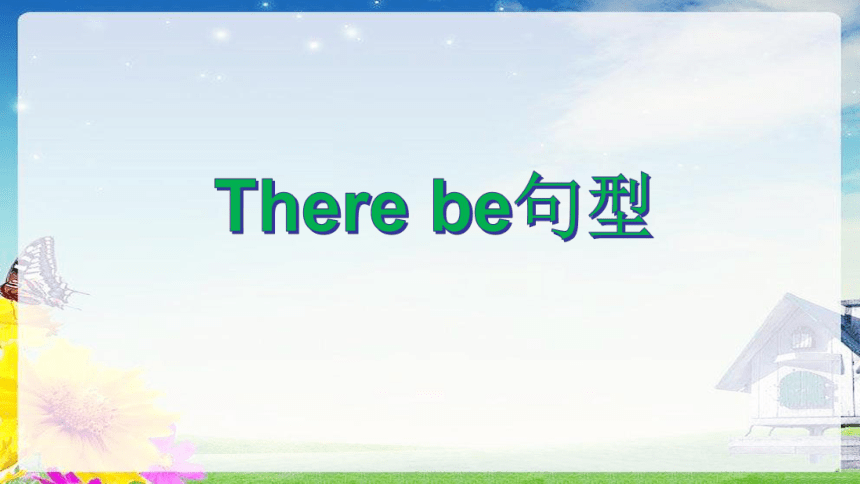
|
|
| 格式 | pptx | ||
| 文件大小 | 538.4KB | ||
| 资源类型 | 教案 | ||
| 版本资源 | 人教版(PEP) | ||
| 科目 | 英语 | ||
| 更新时间 | 2021-03-16 18:11:53 | ||
图片预览

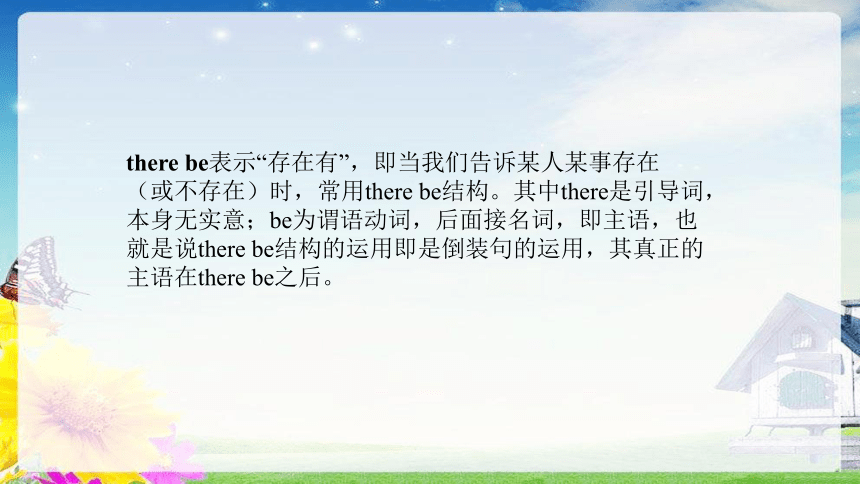
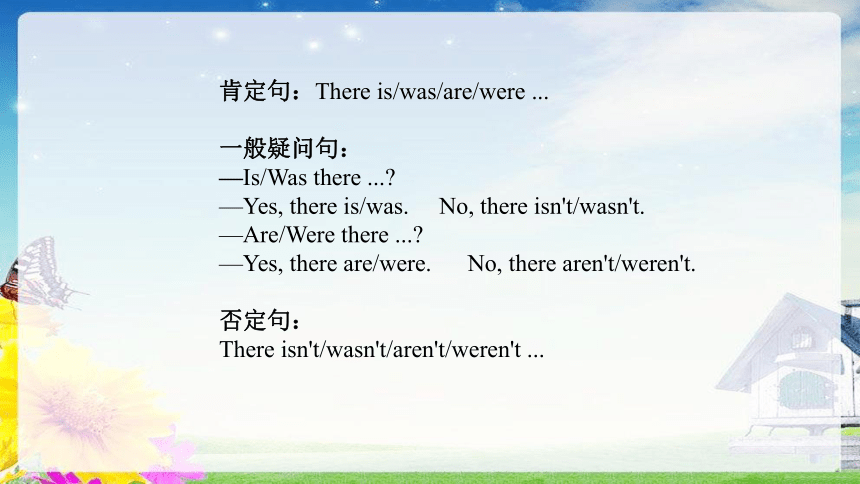
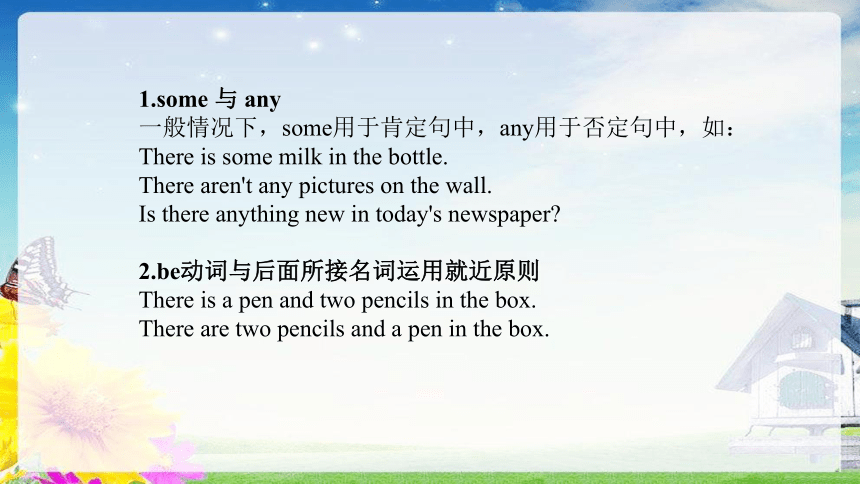
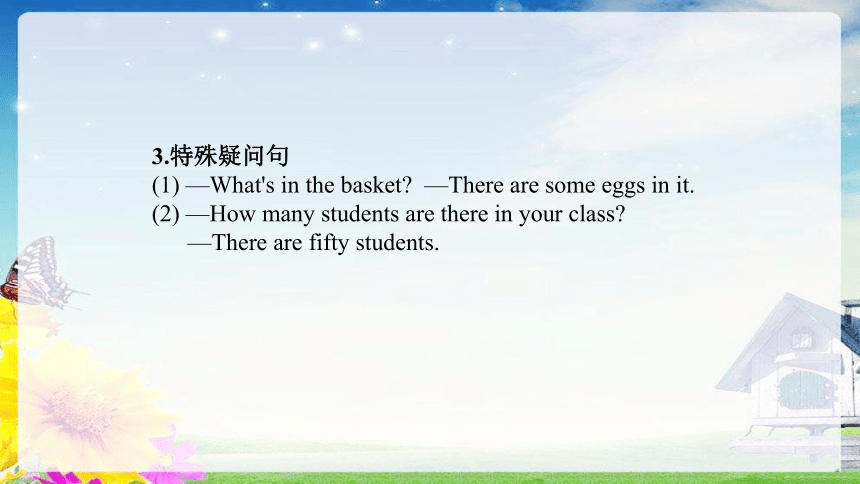
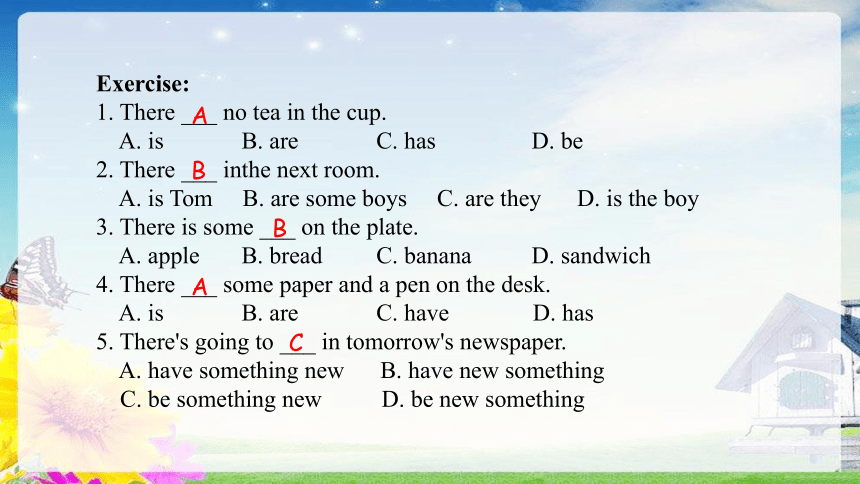

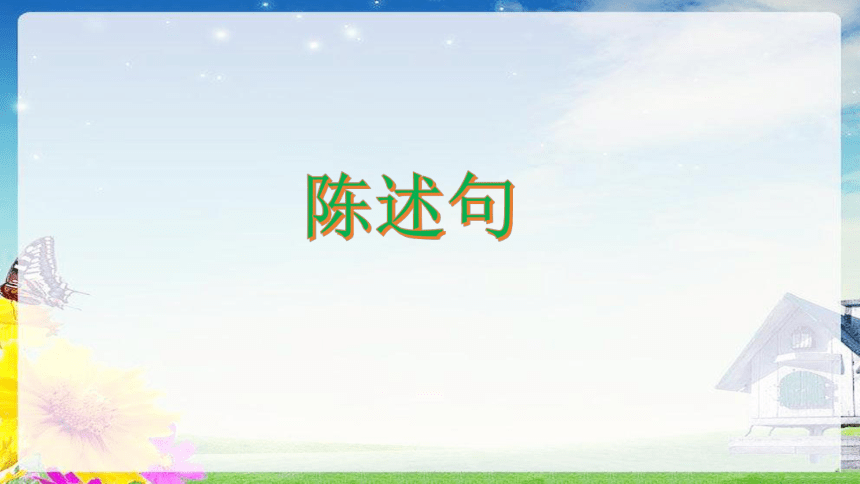
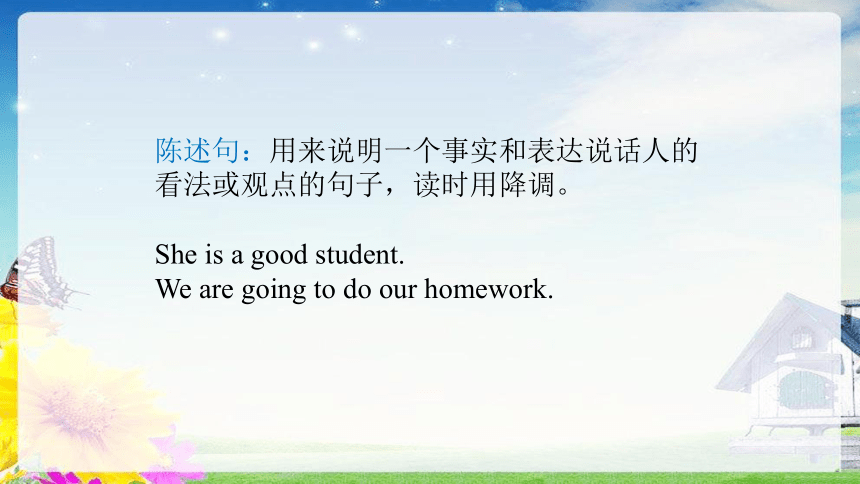
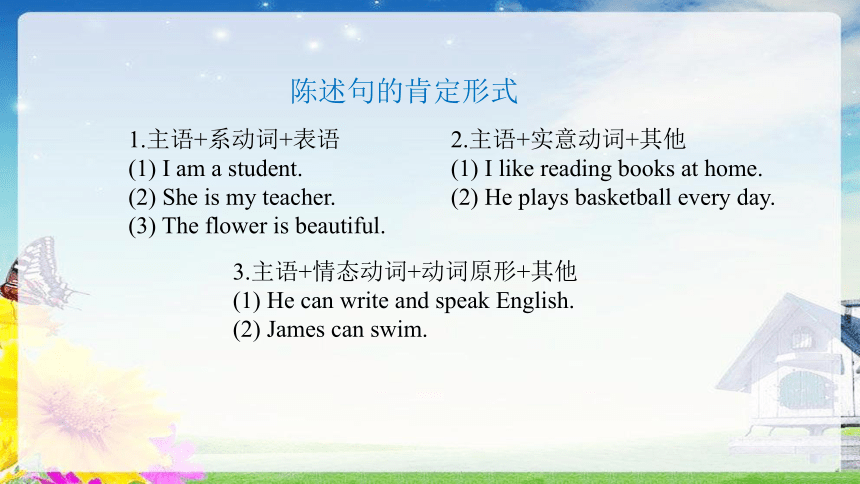
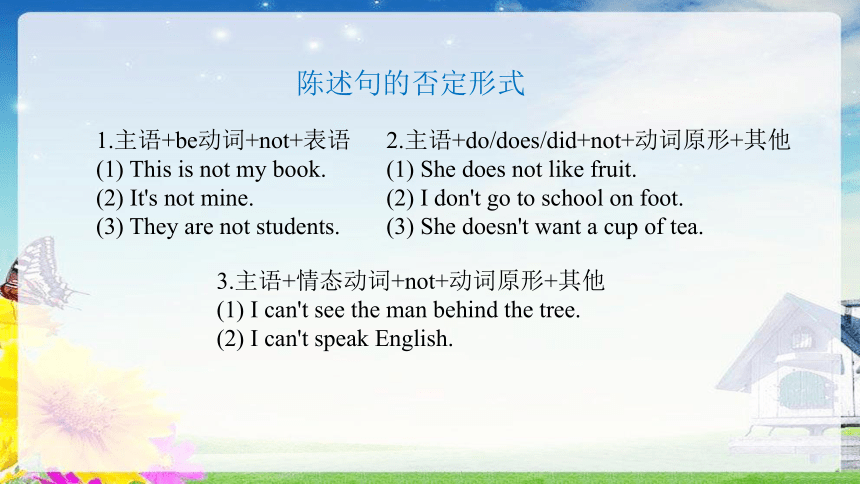
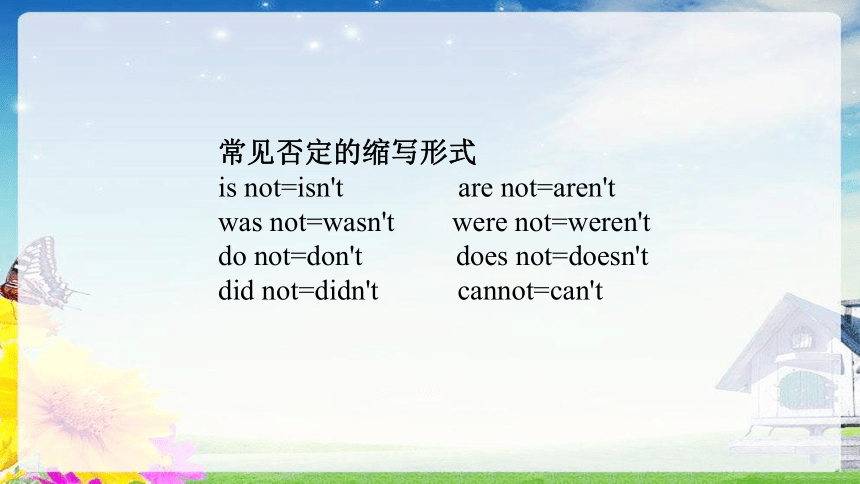
文档简介
There be句型
there be表示“存在有”,即当我们告诉某人某事存在(或不存在)时,常用there be结构。其中there是引导词,本身无实意;be为谓语动词,后面接名词,即主语,也就是说there be结构的运用即是倒装句的运用,其真正的主语在there be之后。
肯定句:There is/was/are/were ...
一般疑问句:
—Is/Was there ...?
—Yes, there is/was. No, there isn't/wasn't.
—Are/Were there ...?
—Yes, there are/were. No, there aren't/weren't.
否定句:
There isn't/wasn't/aren't/weren't ...
1.some 与 any
一般情况下,some用于肯定句中,any用于否定句中,如:
There is some milk in the bottle.
There aren't any pictures on the wall.
Is there anything new in today's newspaper?
2.be动词与后面所接名词运用就近原则
There is a pen and two pencils in the box.
There are two pencils and a pen in the box.
3.特殊疑问句
(1) —What's in the basket? —There are some eggs in it.
(2) —How many students are there in your class?
—There are fifty students.
Exercise:
1. There ___ no tea in the cup.
A. is B. are C. has D. be
2. There ___ inthe next room.
A. is Tom B. are some boys C. are they D. is the boy
3. There is some ___ on the plate.
A. apple B. bread C. banana D. sandwich
4. There ___ some paper and a pen on the desk.
A. is B. are C. have D. has
5. There's going to ___ in tomorrow's newspaper.
A. have something new B. have new something
C. be something new D. be new something
A
B
B
A
C
Goodbye!
陈述句
陈述句:用来说明一个事实和表达说话人的看法或观点的句子,读时用降调。
She is a good student.
We are going to do our homework.
陈述句的肯定形式
1.主语+系动词+表语
(1) I am a student.
(2) She is my teacher.
(3) The flower is beautiful.
2.主语+实意动词+其他
(1) I like reading books at home.
(2) He plays basketball every day.
3.主语+情态动词+动词原形+其他
(1) He can write and speak English.
(2) James can swim.
陈述句的否定形式
1.主语+be动词+not+表语
(1) This is not my book.
(2) It's not mine.
(3) They are not students.
2.主语+do/does/did+not+动词原形+其他
(1) She does not like fruit.
(2) I don't go to school on foot.
(3) She doesn't want a cup of tea.
3.主语+情态动词+not+动词原形+其他
(1) I can't see the man behind the tree.
(2) I can't speak English.
常见否定的缩写形式
is not=isn't are not=aren't
was not=wasn't were not=weren't
do not=don't does not=doesn't
did not=didn't cannot=can't
Goodbye!
祈使句与感叹句
祈使句是用来表示请求、命令、劝告、建议等的句子。习惯上常常省略主语,句末用感叹号或者句号,朗读时常用降调。
祈使句
1.祈使句的肯定式
2.祈使句的否定式
3.祈使句的let式
4.祈使句的强调式
5.不含动词的祈使句
祈使句的形式
在祈使句的肯定式中,谓语动词要使用原形。
Look at the blackboard.
Sit down, please!
Open the door, please!
Keep away from it!
祈使句的肯定式
在祈使句的肯定式中,谓语动词用don't/never+原形。
Don't worry.
Never mind.
Don't turn off the light!
Don't play football on the road!
祈使句的否定式
将下列祈使句变为否定句。
1.Give me some apples.
2.Let's clean the classroom.
3.Be quiet.
4.Please watch TV.
5.Run around the playground.
祈使句的否定式练习
Let + 人称代词(宾格)+动词原形
Let me see.
Let me check.
Let's go to the seaside.
Let's go home.
祈使句的let式
感叹句
感叹句表示说话人的惊奇、愤怒、赞美、喜悦等情绪。
感叹句一般由what和how开头,what修饰名词,how修饰形容词和副词。
what感叹句结构:
1.What+a/an+形容词+名词(+主语+谓语)!
2.What+形容词+名词复数(+主语+谓语)!
例:
What an interesting story (it is)!
What beautiful flowers (they are)!
how感叹句结构:
1.How +形容词/副词+主语+谓语!
例:
How lucky we are!
How quickly the time passed!
Exercise:
将下列陈述句转换为感叹句。
1. She swims wonderfully.
2. It is an interesting book.
3. They are cute pencil boxes.
4. The sunglasses are cool.
5. Her hair is short.
Goodbye!
疑问句
一般疑问句:表示疑问,一般回答只有两种可能Yes或No,一般疑问句中没有疑问词。
如何将一个肯定陈述句改为否定句:
1.看句中有无be动词,如有,把be动词提到句首即可。
2.看句中有无情态动词,如有,把情态动词提到句首即可。
一般疑问句
3.如上述二者都没有,就应把助动词提到句首。分四个步骤:
(1) 肯定陈述句中本来是没有助动词的,要加上去,位置在主语(某人或某物)后,动词前。
(2) 确定助动词用do、does还是did,根据句中动词来判断,动词是原形,助动词就用do;动词是第三人称单数,助动词就用does;动词是过去式,助动词就用did。
(3) 将助动词提到句首。
(4) 将原句中动词恢复原形。
注:句中有some时,要考虑是否要改为any。
1.—Did you read books? 你读书了吗?
—Yes, I did.是的,我读过了。/ No, I didn't. 不,我没有读过。
2.①—Is she quiet? 她文静吗?
—No, she isn't. She's very active. 不,她不文静。她很活跃。
②—Is she strict? 她严格吗?
—Yes, she is, but she's very kind.是的,但是她很和蔼。
3.Is this a teacher's desk? 这是一张讲台桌吗?
Is it cold? 冷吗?
Is her birthday in June? 她的生日在六月吗?
Is this your T-shirt? 这是你的T恤衫吗?
Yes,it is. 是的。/ No, it isn't. 不,不是的。
4.Can you make the bed? 你会铺床吗?
Can you use a computer? 你会使用电脑吗?
Yes, I can. 是的,我会。/ No, I can't. 不,我不会。
5.Are they ducks? 它们是鸭子吗?
Are they eating the honey? 它们在吃蜂蜜吗?
Yes,they are. 是的,它们是。/ No,they aren't. 不,它们不是。
6.Is there a forest in the park? 公园里有一个森林吗?
Is there a river? 那里有条河吗?
Yes,there is. 是的,那里有。/ No,there aren't. 不,那里没有。
7.Are there any pandas in the mountains? 山里有一些熊猫吗?
Are there any fish in the rivers? 河里有一些鱼吗?
Yes, there are. 是的,那里有。/ No,there aren't. 不,那里没有。
8.Are you eating lunch? 你(们)正在吃午餐吗?
Yes, I am. / Yes, we are. 是的,我(们)正在吃。
No, I am not. / No, we aren't. 不,我(们)没有在吃。
9.Is he playing chess? 他正在下棋吗?
Yes, he is. 是的,他是。/ No, he isn't. 不,他没有。
10.Is she counting insects?她正在数昆虫吗?
Yes, she is. 是的,她是。/ No, she isn't.不,她没有。
11.Does she/he teach English? 她(他)教英语吗?
Yes,she/he does. 是的,她(他)是。
No,she/he doesn't. 不,她(他)不是。
特殊疑问句
特殊疑问句:以疑问代词或疑问副词开头,提出疑问的句子。
基本结构:特殊疑问词+一般疑问句
常用的疑问词有:what,who(whom),whose,which,when,where,how,why等,回答时需针对疑问句中的代词和副词来回答,不能用yes或no回答。
1. what对指物名词或谓语动词提出疑问
例:The twins are making a kite. —What are the twins doing?
Mrs Turner asks her son to buy some eggs.
—What does Mrs Turner ask her son to buy?
2. 对名词前的定语提出疑问,疑问词应用which,并且和名词连用
例:I'm going to take the shirt on the right.
—Which shirt are you going to take?
3. 对名词前的定语提出疑问,疑问词应用which,并且和名词连用
例:I'm going to take the shirt on the right.
—Which shirt are you going to take?
4.对指人名词或人称代词提问用who
例:Li Ping is my sister. —Who is Li Ping?
5.对物主代词和名词所有格提问用whose
例:Li Ping's coat—whose coat
my father—whose father
6.对具体时间提出疑问,疑问词用when;对具体几点钟提问,用what time
例:It's 10:00. —What time is it?
I go home at night. —When do you go home?
7.对具体地点提问,疑问词应用where
例:The boys are having a picnic in the park.
—Where are the boys having a picnic?
8.对标原因的从句提问,常见的为because引导的从句,疑问词应用why
例:Tom didn't go to the farm with us because he was ill.
—Why didn't Tom go to the farm with us?
9.对方式或程度等提出疑问,用疑问词how
例:He likes apples very much.—How does he like apples?
10.对数量提出疑问,疑问词为how many/much
要注意后面名词接复数形式
例:There are two sheep. —How many sheep are there?
11.对价格提问,疑问词用how much
例:I pay fifty yuan for the sweater.
—How much do you pay for the sweater?
12.对时间长度提问,应用how long
例:I work in that factory for two years.
—How long do you work in that factory?
13.对频率提问,如:once a year,twice a week,应用how often
例:I swim once a week. —How often do you swim?
14.对具体次数提问,如:once,twice,three times,应用how many times
例:How many times did he call you the day before yesterday?
15.对距离提问,应用how far
例:It's about two kilometres from here.
—How far is it from here?
16.对日期、星期、天气提问,分别用:
What's the date?
What day is it?
What's the weather like?
Goodbye!
there be表示“存在有”,即当我们告诉某人某事存在(或不存在)时,常用there be结构。其中there是引导词,本身无实意;be为谓语动词,后面接名词,即主语,也就是说there be结构的运用即是倒装句的运用,其真正的主语在there be之后。
肯定句:There is/was/are/were ...
一般疑问句:
—Is/Was there ...?
—Yes, there is/was. No, there isn't/wasn't.
—Are/Were there ...?
—Yes, there are/were. No, there aren't/weren't.
否定句:
There isn't/wasn't/aren't/weren't ...
1.some 与 any
一般情况下,some用于肯定句中,any用于否定句中,如:
There is some milk in the bottle.
There aren't any pictures on the wall.
Is there anything new in today's newspaper?
2.be动词与后面所接名词运用就近原则
There is a pen and two pencils in the box.
There are two pencils and a pen in the box.
3.特殊疑问句
(1) —What's in the basket? —There are some eggs in it.
(2) —How many students are there in your class?
—There are fifty students.
Exercise:
1. There ___ no tea in the cup.
A. is B. are C. has D. be
2. There ___ inthe next room.
A. is Tom B. are some boys C. are they D. is the boy
3. There is some ___ on the plate.
A. apple B. bread C. banana D. sandwich
4. There ___ some paper and a pen on the desk.
A. is B. are C. have D. has
5. There's going to ___ in tomorrow's newspaper.
A. have something new B. have new something
C. be something new D. be new something
A
B
B
A
C
Goodbye!
陈述句
陈述句:用来说明一个事实和表达说话人的看法或观点的句子,读时用降调。
She is a good student.
We are going to do our homework.
陈述句的肯定形式
1.主语+系动词+表语
(1) I am a student.
(2) She is my teacher.
(3) The flower is beautiful.
2.主语+实意动词+其他
(1) I like reading books at home.
(2) He plays basketball every day.
3.主语+情态动词+动词原形+其他
(1) He can write and speak English.
(2) James can swim.
陈述句的否定形式
1.主语+be动词+not+表语
(1) This is not my book.
(2) It's not mine.
(3) They are not students.
2.主语+do/does/did+not+动词原形+其他
(1) She does not like fruit.
(2) I don't go to school on foot.
(3) She doesn't want a cup of tea.
3.主语+情态动词+not+动词原形+其他
(1) I can't see the man behind the tree.
(2) I can't speak English.
常见否定的缩写形式
is not=isn't are not=aren't
was not=wasn't were not=weren't
do not=don't does not=doesn't
did not=didn't cannot=can't
Goodbye!
祈使句与感叹句
祈使句是用来表示请求、命令、劝告、建议等的句子。习惯上常常省略主语,句末用感叹号或者句号,朗读时常用降调。
祈使句
1.祈使句的肯定式
2.祈使句的否定式
3.祈使句的let式
4.祈使句的强调式
5.不含动词的祈使句
祈使句的形式
在祈使句的肯定式中,谓语动词要使用原形。
Look at the blackboard.
Sit down, please!
Open the door, please!
Keep away from it!
祈使句的肯定式
在祈使句的肯定式中,谓语动词用don't/never+原形。
Don't worry.
Never mind.
Don't turn off the light!
Don't play football on the road!
祈使句的否定式
将下列祈使句变为否定句。
1.Give me some apples.
2.Let's clean the classroom.
3.Be quiet.
4.Please watch TV.
5.Run around the playground.
祈使句的否定式练习
Let + 人称代词(宾格)+动词原形
Let me see.
Let me check.
Let's go to the seaside.
Let's go home.
祈使句的let式
感叹句
感叹句表示说话人的惊奇、愤怒、赞美、喜悦等情绪。
感叹句一般由what和how开头,what修饰名词,how修饰形容词和副词。
what感叹句结构:
1.What+a/an+形容词+名词(+主语+谓语)!
2.What+形容词+名词复数(+主语+谓语)!
例:
What an interesting story (it is)!
What beautiful flowers (they are)!
how感叹句结构:
1.How +形容词/副词+主语+谓语!
例:
How lucky we are!
How quickly the time passed!
Exercise:
将下列陈述句转换为感叹句。
1. She swims wonderfully.
2. It is an interesting book.
3. They are cute pencil boxes.
4. The sunglasses are cool.
5. Her hair is short.
Goodbye!
疑问句
一般疑问句:表示疑问,一般回答只有两种可能Yes或No,一般疑问句中没有疑问词。
如何将一个肯定陈述句改为否定句:
1.看句中有无be动词,如有,把be动词提到句首即可。
2.看句中有无情态动词,如有,把情态动词提到句首即可。
一般疑问句
3.如上述二者都没有,就应把助动词提到句首。分四个步骤:
(1) 肯定陈述句中本来是没有助动词的,要加上去,位置在主语(某人或某物)后,动词前。
(2) 确定助动词用do、does还是did,根据句中动词来判断,动词是原形,助动词就用do;动词是第三人称单数,助动词就用does;动词是过去式,助动词就用did。
(3) 将助动词提到句首。
(4) 将原句中动词恢复原形。
注:句中有some时,要考虑是否要改为any。
1.—Did you read books? 你读书了吗?
—Yes, I did.是的,我读过了。/ No, I didn't. 不,我没有读过。
2.①—Is she quiet? 她文静吗?
—No, she isn't. She's very active. 不,她不文静。她很活跃。
②—Is she strict? 她严格吗?
—Yes, she is, but she's very kind.是的,但是她很和蔼。
3.Is this a teacher's desk? 这是一张讲台桌吗?
Is it cold? 冷吗?
Is her birthday in June? 她的生日在六月吗?
Is this your T-shirt? 这是你的T恤衫吗?
Yes,it is. 是的。/ No, it isn't. 不,不是的。
4.Can you make the bed? 你会铺床吗?
Can you use a computer? 你会使用电脑吗?
Yes, I can. 是的,我会。/ No, I can't. 不,我不会。
5.Are they ducks? 它们是鸭子吗?
Are they eating the honey? 它们在吃蜂蜜吗?
Yes,they are. 是的,它们是。/ No,they aren't. 不,它们不是。
6.Is there a forest in the park? 公园里有一个森林吗?
Is there a river? 那里有条河吗?
Yes,there is. 是的,那里有。/ No,there aren't. 不,那里没有。
7.Are there any pandas in the mountains? 山里有一些熊猫吗?
Are there any fish in the rivers? 河里有一些鱼吗?
Yes, there are. 是的,那里有。/ No,there aren't. 不,那里没有。
8.Are you eating lunch? 你(们)正在吃午餐吗?
Yes, I am. / Yes, we are. 是的,我(们)正在吃。
No, I am not. / No, we aren't. 不,我(们)没有在吃。
9.Is he playing chess? 他正在下棋吗?
Yes, he is. 是的,他是。/ No, he isn't. 不,他没有。
10.Is she counting insects?她正在数昆虫吗?
Yes, she is. 是的,她是。/ No, she isn't.不,她没有。
11.Does she/he teach English? 她(他)教英语吗?
Yes,she/he does. 是的,她(他)是。
No,she/he doesn't. 不,她(他)不是。
特殊疑问句
特殊疑问句:以疑问代词或疑问副词开头,提出疑问的句子。
基本结构:特殊疑问词+一般疑问句
常用的疑问词有:what,who(whom),whose,which,when,where,how,why等,回答时需针对疑问句中的代词和副词来回答,不能用yes或no回答。
1. what对指物名词或谓语动词提出疑问
例:The twins are making a kite. —What are the twins doing?
Mrs Turner asks her son to buy some eggs.
—What does Mrs Turner ask her son to buy?
2. 对名词前的定语提出疑问,疑问词应用which,并且和名词连用
例:I'm going to take the shirt on the right.
—Which shirt are you going to take?
3. 对名词前的定语提出疑问,疑问词应用which,并且和名词连用
例:I'm going to take the shirt on the right.
—Which shirt are you going to take?
4.对指人名词或人称代词提问用who
例:Li Ping is my sister. —Who is Li Ping?
5.对物主代词和名词所有格提问用whose
例:Li Ping's coat—whose coat
my father—whose father
6.对具体时间提出疑问,疑问词用when;对具体几点钟提问,用what time
例:It's 10:00. —What time is it?
I go home at night. —When do you go home?
7.对具体地点提问,疑问词应用where
例:The boys are having a picnic in the park.
—Where are the boys having a picnic?
8.对标原因的从句提问,常见的为because引导的从句,疑问词应用why
例:Tom didn't go to the farm with us because he was ill.
—Why didn't Tom go to the farm with us?
9.对方式或程度等提出疑问,用疑问词how
例:He likes apples very much.—How does he like apples?
10.对数量提出疑问,疑问词为how many/much
要注意后面名词接复数形式
例:There are two sheep. —How many sheep are there?
11.对价格提问,疑问词用how much
例:I pay fifty yuan for the sweater.
—How much do you pay for the sweater?
12.对时间长度提问,应用how long
例:I work in that factory for two years.
—How long do you work in that factory?
13.对频率提问,如:once a year,twice a week,应用how often
例:I swim once a week. —How often do you swim?
14.对具体次数提问,如:once,twice,three times,应用how many times
例:How many times did he call you the day before yesterday?
15.对距离提问,应用how far
例:It's about two kilometres from here.
—How far is it from here?
16.对日期、星期、天气提问,分别用:
What's the date?
What day is it?
What's the weather like?
Goodbye!
